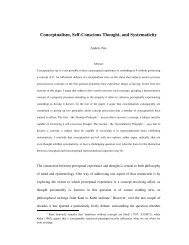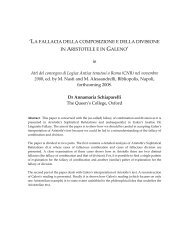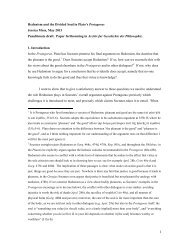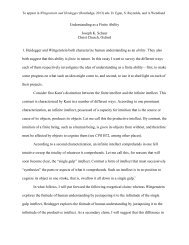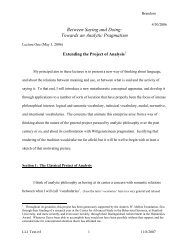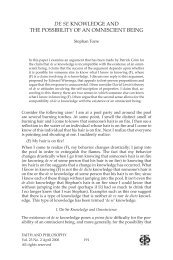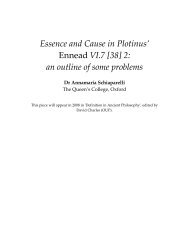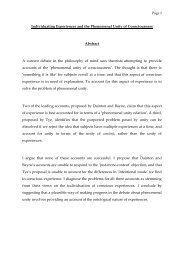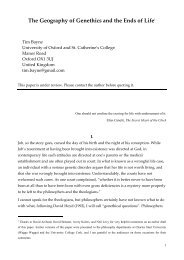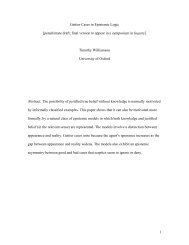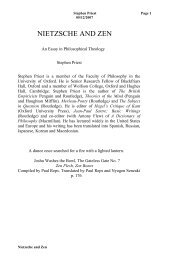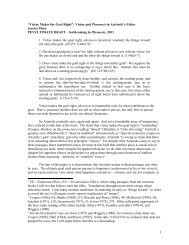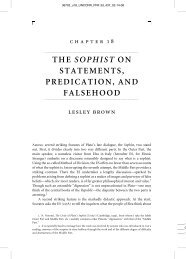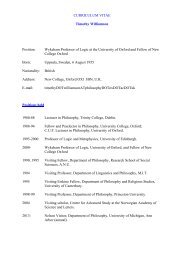What Aristotle can teach us about personality disorder - University of ...
What Aristotle can teach us about personality disorder - University of ...
What Aristotle can teach us about personality disorder - University of ...
You also want an ePaper? Increase the reach of your titles
YUMPU automatically turns print PDFs into web optimized ePapers that Google loves.
make life worth living. These include, for <strong>Aristotle</strong>, friendship and family life, work and productivity,<br />
and physical and intellectual pursuits and pleasures.<br />
Whenever we think <strong>about</strong> what makes life worth living, it is essential to recognize the existence <strong>of</strong><br />
cultural and individual differences in what is valued and what is enjoyed, and respect other<br />
perspectives. Different things <strong>can</strong> make life worth living for different cultures and individuals, and it<br />
is wrong to presume that we inevitably know what these things are for others. But that said,<br />
<strong>Aristotle</strong> is surely right that most people care <strong>about</strong> friendship, family, work and pleasure. It is not<br />
easy to see how a life without these things could that be a good life, a life <strong>of</strong> value that felt to its<br />
subject to be worth living. Furthermore, he is also right that we need virtue to achieve these goods.<br />
By virtue, <strong>Aristotle</strong> means the possession <strong>of</strong> a stable set <strong>of</strong> character traits that allows <strong>us</strong> to think,<br />
feel, and act in the right way, to the right degree, at the right time – to think, feel, and act as the<br />
situation confronting <strong>us</strong> demands. For <strong>Aristotle</strong>, virtue is a mean – a balance – between extremes. In<br />
contrast to virtuo<strong>us</strong> character traits, traits that lie at the extremes do not allow people to think, feel,<br />
and act as the situation demands.<br />
To ill<strong>us</strong>trate this idea, consider a favourite ancient Greek example: the demands <strong>of</strong> war and battle.<br />
At one extreme in battle is the coward. The coward cringes and flees when confronted with the<br />
enemy, no matter the importance <strong>of</strong> the ca<strong>us</strong>e he is fighting for, allowing thoughts <strong>of</strong> death to<br />
possess him, and his fear to overcome him. This is not to think, feel, and act as the situation<br />
demands. At the other extreme in battle is the rash man. The rash man r<strong>us</strong>hes into battle without<br />
thought and consideration, overcome by his own arrogance and aggression. He has no thought for<br />
the reality <strong>of</strong> the situation – that he might, for instance, be killed, leaving his children without a<br />
father, his wife without a h<strong>us</strong>band. He is foolhardy, and impetuo<strong>us</strong>. Again, this is not to think, feel,<br />
and act as the situation demands.<br />
Finally, in contrast to both these extremes, and lying between them, is the courageo<strong>us</strong> man. He<br />
rightly appreciates the danger he faces, and potential cost to him and his loved ones. But he masters<br />
his fear and acts with assurance, dignity, and self-possession. Afterwards, if he is successful, he may<br />
take pride in his achievements, but he will not mock his slain enemies. He shows virtue, both in his<br />
courage, and in his compassion.<br />
The ancient Greek battlefield is <strong>of</strong> course literally far removed from today’s society, but<br />
metaphorically it is an apt expression <strong>of</strong> what many people, especially those who suffer from<br />
<strong>personality</strong> <strong>disorder</strong>, face daily.<br />
We each have our own battles, and the challenge for each <strong>of</strong> <strong>us</strong> is to find a way to handle ourselves<br />
with virtue when confronted with demanding, difficult, and painful situations: to think, feel, and act<br />
in the right way, to the right degree, at the right time – as the situation demands. To find the mean<br />
between the vario<strong>us</strong> extremes that pulls <strong>us</strong> in opposing and less than ideal directions. Doing so<br />
requires a host <strong>of</strong> stable character traits, such as courage and compassion, but also moderation and<br />
temperance, j<strong>us</strong>tice and fair-mindedness, generosity and empathy, patience and persistence,<br />
productivity, tr<strong>us</strong>t and love and respect for ourselves and others. We need these traits in order to<br />
live the good life, and, especially, to have good friendships and relationships with our family, and to<br />
find work and goals and pleasures that we value, and are able to pursue with commitment and<br />
2



